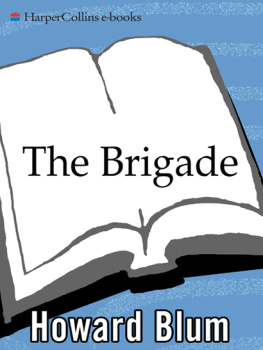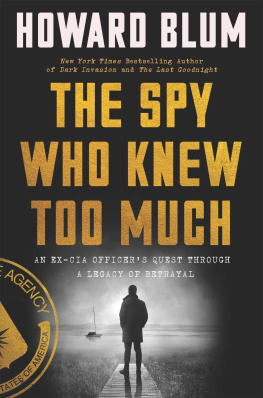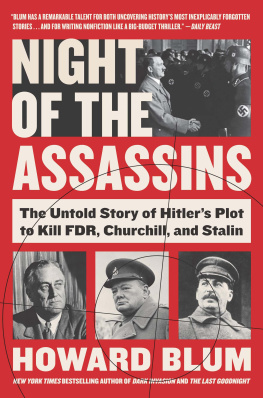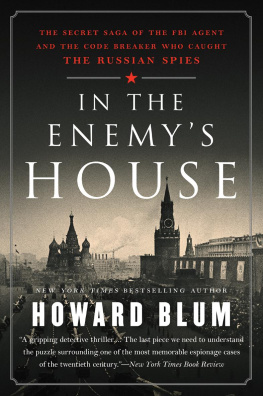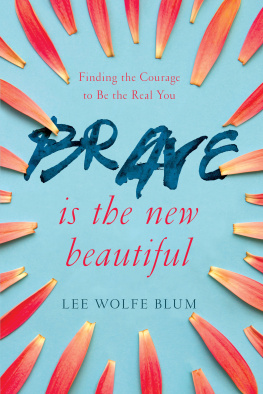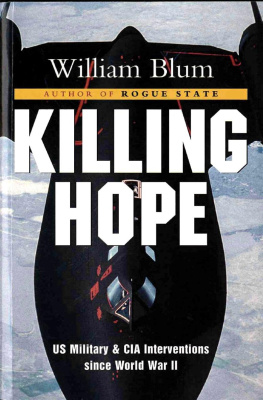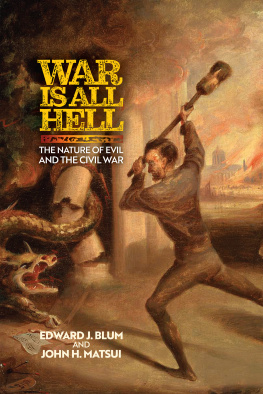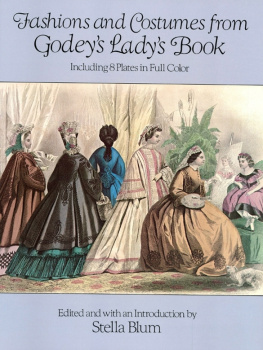Howard Blum - The Brigade
Here you can read online Howard Blum - The Brigade full text of the book (entire story) in english for free. Download pdf and epub, get meaning, cover and reviews about this ebook. genre: Detective and thriller. Description of the work, (preface) as well as reviews are available. Best literature library LitArk.com created for fans of good reading and offers a wide selection of genres:
Romance novel
Science fiction
Adventure
Detective
Science
History
Home and family
Prose
Art
Politics
Computer
Non-fiction
Religion
Business
Children
Humor
Choose a favorite category and find really read worthwhile books. Enjoy immersion in the world of imagination, feel the emotions of the characters or learn something new for yourself, make an fascinating discovery.
- Book:The Brigade
- Author:
- Genre:
- Rating:3 / 5
- Favourites:Add to favourites
- Your mark:
- 60
- 1
- 2
- 3
- 4
- 5
The Brigade: summary, description and annotation
We offer to read an annotation, description, summary or preface (depends on what the author of the book "The Brigade" wrote himself). If you haven't found the necessary information about the book — write in the comments, we will try to find it.
The Brigade — read online for free the complete book (whole text) full work
Below is the text of the book, divided by pages. System saving the place of the last page read, allows you to conveniently read the book "The Brigade" online for free, without having to search again every time where you left off. Put a bookmark, and you can go to the page where you finished reading at any time.
Font size:
Interval:
Bookmark:
An Epic Story of Vengeance, Salvation, and World War II

Once again for Jenny.
Always with love.
Then out spoke brave Horatius, the Captain of the Gate, To every man upon this earth, death cometh soon or late, and how can man die better than facing fearful odds, for the ashes of his fathers and the temples of his gods.
M ACAULAY
The troops were singing. The Hebrew songs had broken out
The storm grew worse. Rain poured down throughout the morning,
It was an odd competition, and of no apparent consequence.
In winter a cold, dispiriting rain habitually wrapped itself around
Carmi still waited impatiently for the Brigade to be called
Peltz, too, was eager to get his men ready for
The weeks in Fiuggi dragged on. And as the men
The winter lull in the fighting gave the men the
Leah Pinchuk was afraid to sleep in the dark. She
Peltz finished reading the intelligence report, and underlined the final
Capt. Johanan Peltz did not dare to lift his head.
Peltz moved through the darkness, listening to the silence. His
Leah Pinchuk was hungry. She walked slowly behind her mother,
When Carmi and Peltz had served together in the Palestinian
Two hours later, Peltz was lying in the mud near
It was just before ten on a sunny late March
High in the Apennine foothills, Carmi stood daringly close to
When Peltz read this memo, he had one thought, and
Once again, Leah Pinchuk walked through the forest. But now
Just days before the Passover holiday, Peltzs company was on
The door opened and Boris stared at Leah. He did
The fateful Passover weekfive dead and fifty-two woundedleft Carmi eager
Exactly one week later the Brigade attacked.
Deep in the Chernigov forests of the Ukraine, Leah Pinchuk
On the evening before the Brigade left for Germany, when
But the British would not let them go into Germany.
The war had ended only a month ago, and the
Leah waited for her punishment, but an entire week passed
Two women had been attacked. In the middle of the
It was not quite midnight when Carmi and Grossman arrived
In Rovno, Leah found work. And she fell in love.
As instructed Peltz parked his jeep by the road, but
The narrow road curved steeply down from the Brenner Pass.
Nighttime in a village near Mauthausen, Austria. Two men in
Peltz made a decision that summer. There had been no
During the long trip across Europe, the two men hardly
Carmi arrived in Paris early on a hot July morning.
Where was Leah?
Carmi returned from Paris wondering if perhaps he had promised
Carmi listened to Peltz, but he refused to accept that
Carmi, still feverish, opened his eyes and saw Peltz standing
Around eight in the morning, an hour or two after
Pinchuk, meanwhile, prepared for the next stage of his journey.
Two days after Carmis convoys returned from Graz, the Brigade
The Russian colonel had left Pinchuk in an unpopulated area
In the first week of April, nearly a month after
Both Carmi and Arazi were completely surprised. Neither of the
Pinchuk returned to Salzburg three weeks after he had left.
When Carmi returned to his battalion at the end of
It had been politics which had persuaded His Majestys government
On the fifth of Iyar, 5708May 14, 1948the independent State
But this story did not end in the gray sands
T his is a true story.
It is an account of the activities of the Jewish Brigade, an army of five thousand men from Palestine sent by the British to fight in Europe during the last months of the Second World War.
It is also the story of three soldiersIsrael Carmi, Johanan Peltz, and Arie Pinchukwho volunteered to serve in this force. They were men whose lives were transformed by the times in which they lived; and, more consequentially, they were men whose actions transformed the world around them.
To accomplish these two intertwined narrative ambitions, one thread historical, the other personal, I have employed a variety of sources: 114 separate interviews; government archives in Britain, Israel, and the United States; and a small mountain of reference books, published in both English and Hebrew. A detailed chapter-by-chapter sourcing follows at the end of this book.
However, since The Brigade is so much a story about these three menhow they lived their lives, and how the resolutions of their own internal conflicts had an effect on larger eventsit is important for the reader to know from the outset how I can write about them with such knowledge and authority.
I had a reporters most valuable substantiating resource: eyewitness testimony. Not only did all three men sit for a series of lengthy interviewsI have their words on tape, on video, and on the pages of the yellow legal pads I filled at each of our sessionsbut they also made available their own unpublished memoirs. These were thoughtful and detailed works (Carmis went on for 239 single-spaced pages, while Peltzs was more than twice that), exciting to read and remarkably candid.
In the Note on Sources that appears at the end of this book I will document chapter-by-chapter how these memoirs, as well as Leah Pinchuk Zeigers own reminiscences, were unique and invaluable sources. But for now it should be sufficient to say that to a significant degree these unpublished autobiographical works were a resource that enabled me to report accurately what people were thinking, feeling, and saying sixty years ago. Without them, I could not have written this true story in such a fashion.
I t was only a hundred days since the invasion at Normandy, but as the first cool nights of fall arrived, the Allied command was confident the war in Europe would soon be over. Paris had been liberated. The lights were back on in London. The Russians were fighting in Tallinn, Riga, and the streets of Warsaw. And the Allied troopsthe largest army in the history of the worldwere moving rapidly to cross the Rhine. There would be more combat, and more deaths, but by September 1944, the outcome of the war was no longer in doubt.
Meeting with correspondents as his troops pushed through France, Gen. Dwight D. Eisenhower, the Supreme Allied Commander, exuberantly declared that Germanys military situation was hopeless. Many in the Nazi high command had also come to a similar conclusion. There comes an evening in every campaign, Lt. Gen. Frederick Heim, commander of the captured garrison at Boulogne and veteran of two previous encirclements at Kiev and Stalingrad, conceded on that same day in September. This is the twilight.
It was in this twilight that Prime Minister Winston Churchill realized he had to act on the petitions from the Jewish Agency in Palestine, or soon it would be too late. Since the start of the war the Jews in this British Mandate territory had been lobbying for the opportunity to fight the Nazis as a separate unit in His Majestys army. For five years, the British had found excusesshortages of equipment, training problems, recruitment difficultiesto justify their long reviews and ultimate refusals. The truth, however, was bluntly expressed by the British secretary of state for war. We have not asked the Jews for these units, he wrote to the colonial secretary, and we do not want them for our war purposes. On the contrary, the War Office have always made it quite clear that they would regard them as an embarrassment rather than a help.
There was reason for this animosity: the British government knew they were dealing with men who had fought against them in the past, and very likely would be their enemies in the future.
Font size:
Interval:
Bookmark:
Similar books «The Brigade»
Look at similar books to The Brigade. We have selected literature similar in name and meaning in the hope of providing readers with more options to find new, interesting, not yet read works.
Discussion, reviews of the book The Brigade and just readers' own opinions. Leave your comments, write what you think about the work, its meaning or the main characters. Specify what exactly you liked and what you didn't like, and why you think so.

